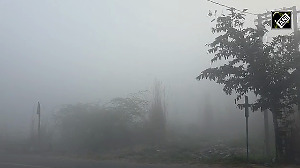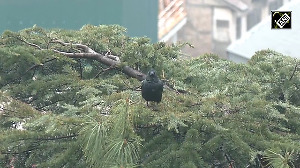Senior US administration sources and law enforcement officials have told rediff.com that it was President Barack Obama's "personal interest" in the David Coleman Headley case that led to the speedy indictment of the Chicago-based Pakistan American and also the dispatching of a team to New Delhi to brief India sleuths.
Sources acknowledged that Obama's interest was the direct consequence of Prime Minister Dr Manmohan Singh forcefully bringing up the Headley case during their Oval Office Summit on November 24 while discussing the increasing threat of the Lakshar-e-Tayiba faced by India.
Headley, who was arrested in October for planning terrorist attacks against a Danish newspaper and two of its employees for publishing cartoons of Prophet Mohammed and for conducting extensive surveillance of targets in Mumbai for more than two years preceding the 26/11 attacks, the Federal Bureau of Investigation's chargesheet on December 7 said.
It had also alleged that Headley had attended terrorism training camps in Pakistan conducted by the LeT and conspired with its members in planning and executing the attacks in Denmark and India.
Headley, 49, pleaded not guilty to the 12-count criminal information with six counts of conspiracy to bomb public places in India, to murder and maim people both in India and Denmark, to provide material support to foreign terrorist plots, and to provide material support to LeT, and six counts of aiding and abetting the murder of US citizens in India.
The procedural appearance took less than five minutes, after which he was led back into custody.
The FBI had said that Headley had, through his attorneys, authorised the justice department to disclose that he was cooperating in the ongoing investigation of both the Danish and Indian terror plots.
Sources told rediff.com that after Dr Singh had expressed his concerns to Obama over the inability of Indian agents to question Headley, and that this was a test case in terms of US-India cooperation to combat terrorism, which was an integral part of the Joint Statement that was released after their summit, Obama had instructed his National Security Adviser Jim Jones to act on this matter and to keep him informed.
Jones had brought this up with FBI Director Robert Mueller, who personally issued directives on this and also instructed the FBI to send a team to New Delhi to brief the Indians.
The sources said that Mueller had attended the arraignment of Headley in Chicago and was keeping Jones apprised, and the national security adviser was in turn keeping the president informed.
When the charges against Headley were filed by the FBI, Mueller said, "This case illustrates the importance of continued global cooperation to combat terrorism around the world," and noted that "the FBI continues to strengthen relationships and to foster collaboration with our international partners to best ensure our collective ability to identify and disrupt international terror networks".
David Kris, assistant attorney general for national security said, "This case serves as a reminder that the terrorist threat is global in nature and requires constant vigilance at home and abroad."
"We continue to share leads developed in this investigation with our foreign and domestic law enforcement partners as we work together on this important matter," he added.
The sources acknowledged that the President had later conferred with his top aides, including Jones, and informed India that legal issues precluded access to Headley. Obama then ensured that India was provided with the next best option in terms of extensive briefings by the FBI on all aspects of the case.
On the day of Headley's indictment, White House spokesman Robert Gibbs remarked that it was "an important day" in the fight against terrorism.
"Obviously, I continue to say, and the president does, too, that we have taken and will continue to take every step necessary to protect the American people," he said.
State Department spokesman Ian Kelly in lending credence to the disclosure said, "This visit (by the FBI team almost simultaneously with the filing of the chargesheet against Headley) reflects the president's commitment to Indian Prime Minister Manmohan Singh, during his recent visit to cooperate closely on the case."
On December 10, when Assistant Secretary for Public Affairs P J Crowley was asked if the US would acquiesce to the Indian request to extradite Headley, he said, "Obviously, we do have an extradition treaty with India," he said, "but how that will work going forward, I think that's too premature."
India's Home Secretary G K Pillai had said in New Delhi that India would seek Headley's extradition, but senior sources told India Abroad that it was unlikely and that Headley would be "prosecuted, tried and sentenced here in the US."
"You can bet on that," the source asserted.
Some sources argued that the reason Headley was not arraigned weeks after his arrest was because there was a tug-of-war between the FBI and the Drug Enforcement Administration, for which Headley had at one time carried out undercover operations in Pakistan as a plea bargain to avoid along jail sentence for smuggling heroin into the US, and was even being considered for more operations in Pakistan and Afghanistan. However, law enforcement officials dismissed this contention and said the FBI was "conducting all of the discovery it could" in collecting information about Headley's travel to India "to collect all of the evidence to have an ironclad case".
Meanwhile, former Central Intelligence Agency, South Asia analyst, Lisa Curtis, who now is a senior research fellow at the conservative think-tank The Heritage Foundation in Washington, slammed law enforcement, saying that the Headley case clearly showed that "despite proof of LeT involvement in the Mumbai attacks, the US has up to now failed to prioritise the goal of pressing Pakistan to take serious action against the group."
She said, "As recently as six months ago, some senior officials refused to recognise that the LeT also posed a threat to US interests. These officials viewed the LeT solely through the Indo-Pakistani lens and asserted that it was more important for the US to use its leverage with Pakistan to go after the Al Qaeda rather than a group whose primary focus was attacking India."
Curtis hoped that "with the breaking of the Headley case, this is all likely to change". "Given the LeT's targeting of the Danish newspaper and Headley's international connections and pan-Islamist outlook, it is now clear that the LeT could easily have turned its guns on a US target and will likely do so unless the Pakistan government shuts down the group now," she said.
"Pakistan has long been ambivalent about shutting down terrorist groups whose primary focus is destabilising India," she argued.
"This has not only put Indian citizens at risk, but it is now clear that Pakistani negligence in dealing appropriately with groups like the LeT has also put US and other Western citizens at risk."
Curtis asserted that in the wake of the "exposed Headley terrorist plots, the US and its allies must insist Pakistan shut down the LeT once and for all or risk international condemnation".
She said, in this regard, Islamabad's "reluctance to prosecute LeT leader Hafiz Mohammed Saeed should be a major concern for Washington."





 © 2025
© 2025